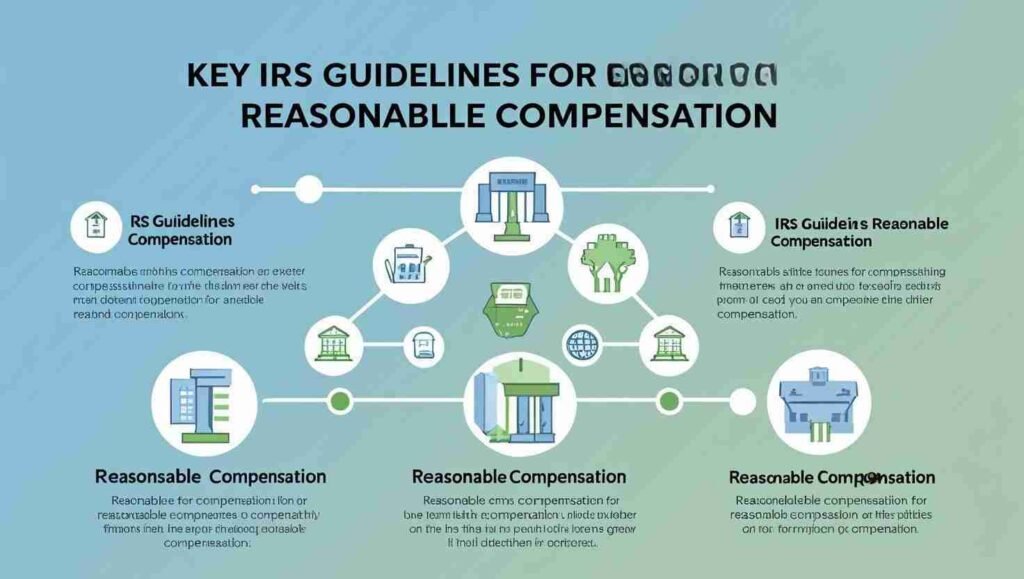As an S-corporation owner, setting a reasonable compensation is essential for complying with IRS regulations and optimizing your tax strategy. This article explains what reasonable compensation is, why it matters, and how to ensure your salary aligns with IRS expectations.
What is Reasonable Compensation?
Reasonable compensation, as defined by the IRS, is the salary or wage a comparable business would pay for similar services under similar circumstances. For S-corp owners who also work for their company, this means paying yourself a fair salary for your services before taking any distributions. This salary is subject to payroll taxes, unlike distributions, which are taxed only as personal income.

Why It Matters
Reasonable compensation is critical for two main reasons:
- Tax Compliance: The IRS requires S-corp shareholder-employees to receive a reasonable salary for their work. Failing to do so may lead the IRS to reclassify distributions as salary, resulting in back taxes, penalties, and interest.
- Tax Optimization: By balancing your salary and distributions, you can minimize payroll taxes while maximizing tax-free distributions, potentially saving thousands annually.
Properly setting your salary ensures you avoid IRS scrutiny while optimizing your financial strategy.
IRS Guidelines for Reasonable Compensation
The IRS mandates that S-corporations pay reasonable compensation to shareholder-employees before distributing profits as non-wage distributions. According to the IRS, the salary should reflect the value of services provided and not exceed the total amount received by the shareholder.

The IRS evaluates reasonable compensation based on several factors:
- Training and experience of the shareholder-employee
- Duties and responsibilities performed
- Time and effort devoted to the business
- Dividend history of the corporation
- Payments to non-shareholder employees
- Timing and manner of paying bonuses
- Compensation paid by comparable businesses for similar services
- Existence of formal compensation agreements
- Use of a formula to determine compensation
These factors help ensure your salary aligns with industry standards and IRS expectations.
How to Determine Reasonable Compensation
To set a reasonable salary, research what similar roles in your industry and location are paid. Here are some reliable resources to guide you:

- Bureau of Labor Statistics (BLS): Offers wage data for over 800 occupations, filterable by location.
- Glassdoor: Provides salary information based on user submissions.
- Salary.com: Delivers detailed salary data for various roles and regions.
- PayScale: Another source for salary benchmarks.
- RCReports: Specializes in reasonable compensation analysis for S-corp owners, offering tailored reports.
After identifying a benchmark salary, adjust it based on your business’s profitability, the time you dedicate, and other relevant factors. For example, if you work part-time or your business relies heavily on assets rather than your labor, a lower salary may be justified, provided you document your reasoning.
Common Mistakes to Avoid
S-corp owners often make mistakes that can trigger IRS audits. Here are two common pitfalls and how to avoid them:
- Not Paying a Salary or Paying Too Little: Some owners take only distributions to avoid payroll taxes. This is risky, as the IRS may reclassify distributions as salary, leading to penalties. Always pay a salary aligned with industry standards.
- Relying on Arbitrary Formulas: Rules like the “60/40 rule” (60% salary, 40% distributions) are not IRS-approved and may not hold up in an audit. Base your salary on market data and document your decision-making process.
To stay compliant, maintain records of how you determined your salary, including the resources used and comparisons to industry standards.
Example: Setting a Reasonable Salary
Consider Jane, who owns an S-corporation providing marketing services. Her business generated $150,000 in profit last year. After researching, she finds that marketing managers in her area earn an average of $80,000 annually, according to BLS data. Jane decides to pay herself an $80,000 salary, taking the remaining $70,000 as distributions. This approach ensures IRS compliance while optimizing her tax savings.
Simplify with Our Calculator
Determining reasonable compensation can be complex, but our Reasonable Compensation Calculator makes it easy. By factoring in industry standards, your role, and other IRS criteria, our tool helps you set a salary that’s both fair and compliant.
Want to dive deeper? Check out our step-by-step guide on calculating reasonable compensation or learn about tax planning strategies for S-corps.
External Resources
- IRS: S Corporation Compensation and Medical Insurance Issues
- BLS Wage Data
- Glassdoor
- Salary.com
- PayScale
- RCReports
By setting a reasonable compensation, you can focus on growing your business with confidence, knowing you’re compliant with IRS rules and optimizing your tax strategy.